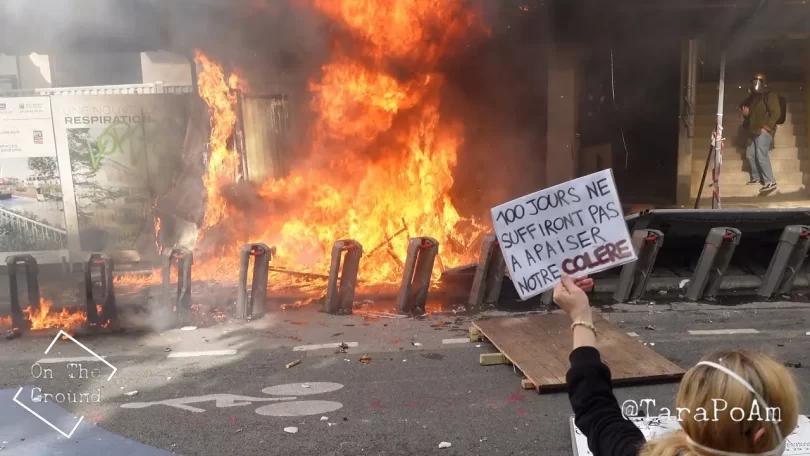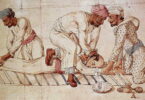A new and hostile national identity group has emerged after France’s failure to integrate mass immigration.
2023-07-17 Mathieu Bock-Côté
T
he American media, like that of the English-speaking world more generally, has wanted to see in the recent French riots a legitimate popular revolt against the neocolonial regime that supposedly reigns in that country’s immigrant-heavy inner-ring suburbs, or “banlieues.” More specifically, they have portrayed it as a revolt against the twin pillars of that regime: repressive policing against the young men who live there and a form of secularism often equated in the United States with Islamophobic persecution.
For America’s progressive intelligentsia, it is hard not to conflate the condition of the banlieues with that of black America, as if the two histories could be easily transposed. And indeed, France’s far-left “indigenous” activists do the same, projecting their situation onto that of African Americans as if they belonged to a single International of “racialized” people. The New York Times, in its role as latter-day Pravda, is fond of giving a platform to these would-be BLM activists à la française, speaking as they do the familiar language of diversitarian revelation: They are racial exiles, tearing themselves free from a fundamentally racist Europe.
Rarely has a sociological analysis been more divorced from reality. It is true that the recent explosion had its origins in what appears to be a police “blunder,” caught on video and circulated on social media to the point of saturation. But this blunder, if that’s what it was—the investigation is ongoing and would seem more complex than first appeared—was quickly seized upon by those eager for an opportunity to run riot. In this, the riots are the outcome of an ever-worsening situation twenty years in the making, the ethnic dimension of which is beyond dispute.
Whatever progressive academic sociology may say to the contrary, the French banlieues are not “abandoned territories”—indeed, they have over the years been showered with billions and billions of Euros, none of which has fundamentally improved their condition. They have not been abandoned, no, but they have received a massive tide of immigrants, so deeply transforming their demography that one might reasonably speak of a change of people. France has not so much withdrawn from them as it has been driven out—in some places, like Sarcelles, French Jews first of all.
It is commonplace to describe these places as “lawless areas,” but in truth they are subject to a hybrid order, where the power of drug traffickers meets that of radical imams. The growing violence of the traffickers is exacerbated by their success in enlisting neighborhood youth in their trade, as if the prerogatives of sovereignty were theirs. The imams, for their part, supply a sort of regulatory moral authority. Indeed, such is their power that interethnic gang wars between identically Muslim gangs are now settled under the auspices of the Mosque—as we saw in Dijon in 2020, when imams resolved a violent dispute pitting Chechen and Moroccan gangs against one another.
This has led some to describe these places as foreign enclaves alternating between secession and a spirit of expansion, with the gangs venturing ever deeper into our big cities, driven there less by the demands of ideology than by an instinct for conquest, pushing them to take control of the territory. This is much more than a simple question of delinquency. On public transportation, a growing number of women now wear loose-fitting clothes, de facto submitting to the customs of Islam so as to avoid harassment by those who believe that the only respectable woman is a veiled one.
But back to the riots. What are we to call this sea change, this radicalization of the situation? Some have appealed to the concept of civil war. But this seems fundamentally inadequate, for a civil war presupposes that its antagonists belong to the same people. If one is not to reduce French nationality to a purely legal and administrative affair, however, it must be acknowledged that the conflict—present or to come—is between populations who see themselves as belonging to two different peoples, even two different civilizations. Pierre Brochand, former head of the DGSE, France’s equivalent of the CIA, has described things more tersely, calling it an “uprising against the French national state on the part of a significant portion of the extra-European youth present on its territory.”
This comes as little surprise. One need only think of the entirely routine violence against police in the banlieues or the fact that, at every major sporting event, a large segment of this population prefers to wave the flags of its countries of origin rather than the Tricolor. Behind the growing volume of faits divers, what we are witnessing is in fact the emergence of a conquering delinquency. By means of hyperviolence, it is extending its control over ever-larger swathes of the country. In France, there exists a hatred of France. One thing now seems obvious: a country cannot be indifferent to the population that composes it, nor solely define itself on the basis of universal values, however republican they may be. And it need hardly be said—but still must be said—that the first victims of this emergent order are the very residents of these neighborhoods who desire to join French society.
Terrified at the idea of noticing that mass immigration has on the whole been a negative historic experience for Europe, the regime’s authorized representatives have counter-attacked, pointing out that 90 percent of those arrested in the riots were French citizens. But they do not realize what these figures reveal: the ever-deepening rift between legal nationality and existential or, if you like, identitarian nationality. It is said that immigration has nothing to do with the riots. This is the new official truth, repeated time and again. And yet here we are at the fourth generation of France’s immigrant communities; each has been less well-integrated than the last. A new people formed from immigrant-origin populations has emerged within the French political community. This phenomenon is at once the necessary condition and object of indigenist propaganda. By accusing France of systemic and structural racism, an identitarian far left thereby seeks to redefine the identity of the banlieues from the perspective of post-colonial revanchism.
But there is nothing new about the regime’s denial. After foreign spectators were attacked at the national stadium in June 2022, the minister of the interior blamed it on British supporters. When it became obvious that the violence had in fact been perpetrated by suburban gangs, a strange veil of silence fell over these events in the media. The authorities, meanwhile, destroyed the video files detailing the extent of the violence. In much the same way, following the recent riots, many have demanded that social media networks be subject to political oversight. Officially, this is to prevent them from being used by the rioters in the next crisis. In fact, it is to suppress first-person testimony and images that might support a different narrative of events, one that puts immigration front and center in discussions of crime and rioting.
Controlling the way the media represents events is essential to sustaining the official narrative of social harmony. It is in this same spirit that some have called for the shuttering of my place of work, CNEWS, a fundamentally pluralistic news channel accused of failing to observe the codes of diversitarian orthodoxy in its coverage of events. Elsewhere in the West, this would be condemned as looming authoritarianism. But in France, calls for censorship are now back in favor—for the sake of the Republic.
More and more people are nevertheless losing faith in this Soviet-style ideology and its institutionalized lies. It tells French people that what happened did not happen and that, if they hope to remain in the bounds of social and media respectability, they must publicly say the opposite of what they privately notice. For the diversitarian regime, only one weapon remains: to lump all those who criticize it in with the “far right,” a concept lacking all rigor and that above all (and even exclusively) serves to condemn those associated with it to social death. The political and media elites have used and abused this term with such abandon that they have made themselves ridiculous.
Not that it particularly bothers them. The essential thing is to create an intimidating environment in which anyone who might be tempted to step out of line is faced with immediate banishment and no hope of ever returning. They are forever branded with the sign of the devil, of the outlaw, the pariah, he who is to be shunned. Reality, however, can never be entirely made to fit the mold of ideology. Whatever one may say to the contrary, matters of civilization and identity will continue to structure the French political landscape and, more broadly, that of Western Europe as a whole.
Source:https://www.theamericanconservative.com/what-do-the-french-riots-mean/
Translated by Ethan Rundell, a translator, journalist, and cofounder, with Louis Betty, of Vauban Books. He lives in North Carolina.
ABOUT THE AUTHOR
Mathieu Bock-Côté
Mathieu Bock-Côté is a French-Canadian intellectual and essayist and the author of seven books, including, most recently, La Révolution racialiste et autres virus idéologiques [The Racialist Revolution and Other Ideological Viruses, 2021]. A resident of Paris since 2021, he is a columnist for Le Figaro newspaper and the host of weekly political commentary programs on French cable news network CNEWS and the Europe 1 radio station.







